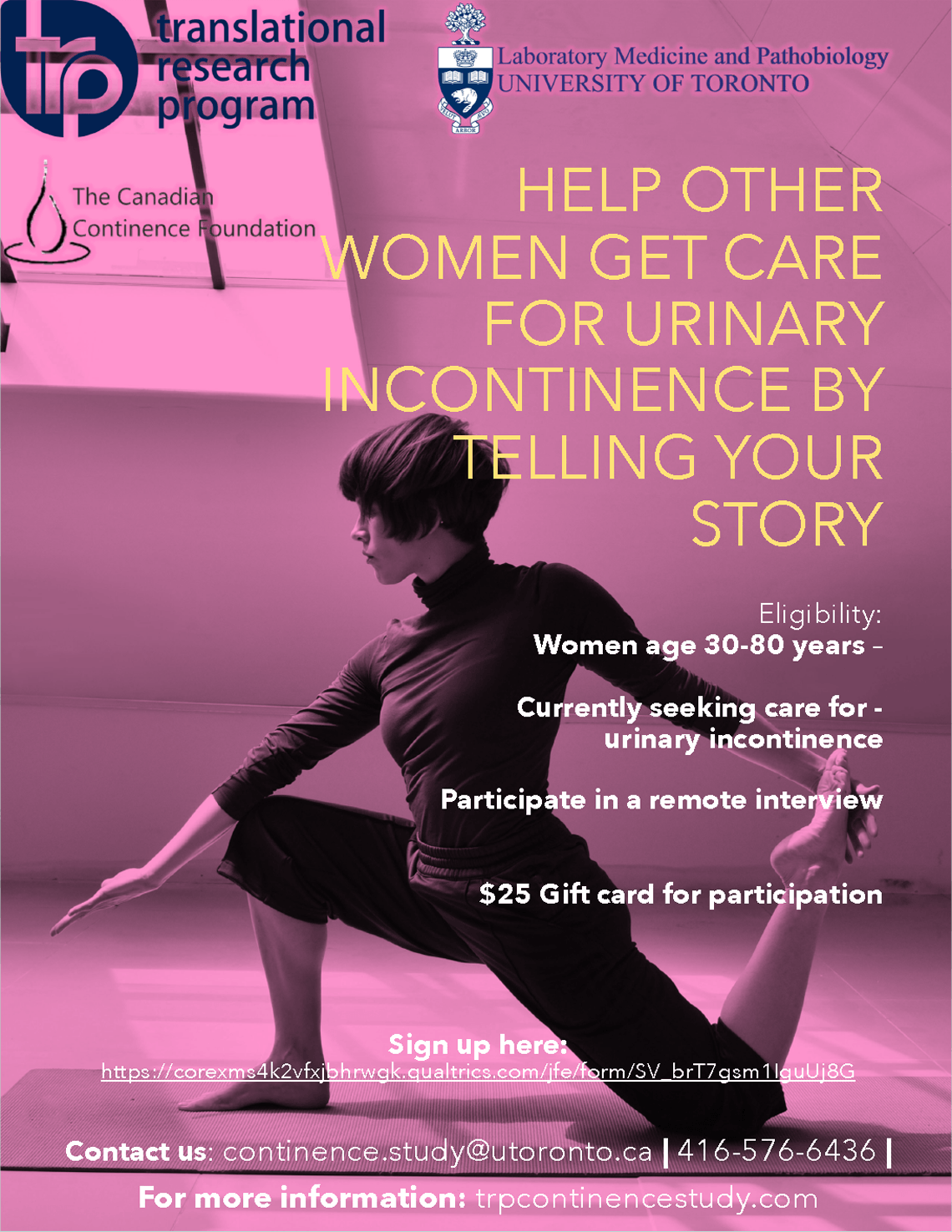
New!
CRC Research is conducting a market Research Study
CRC Research is conducting a market research study to better understand the experiences and views of people living with Wet Overactive Bladder (OAB) or Urge Incontinence, and we’re looking for participants. If you are a nurse, please feel free to pass this note and link onto your Wet OAB patients.
Participation involves a 60-minute one-on-one telephone discussion with an experienced healthcare moderator. All you need is access to a telephone landline and a computer with high-speed Internet as we will show you some materials during the session.
There is no preparation required in advance and there will be no follow-up afterwards. There will be no attempt to sell you anything at any time. What is needed is to simply understand your experience and opinions. Previous participants have indicated that they enjoyed participating and valued the opportunity to share their experiences and views.
As your privacy and confidentiality is important, you and your comments will remain confidential and anonymous at all times.
Please phone or email Julie Kanhnha at 1-866-711-5948 or julie@crcresearch.com, or take a few minutes to fill out the questionnaire to verify your eligibility to complete the session:
https://crcconsumerresearch.ca/index.php?r=survey/index&sid=114798&lang=en.
If you qualify, Julie will get in touch with you with further participation details.
If you complete the 60-minute interview, you will receive an honorarium of $150.00 to thank you for your time.
We look forward to hearing from you, and learning from you!
Celebrating World Continence Week 2022
A lecture regarding third line therapies for refractory overactive bladder, and urgency incontinence. Presented by Dr. Dean Elterman, watch here.
The Canadian Continence Foundation invites you to a free live webinar taking place June 20th, as part of the 2022 celebration of World Continence Week.
Click here to register for the free webinar.

You can help others get care for urinary incontinence!

For more information, contact us by
email: continence.study@utoronto.ca
telephone: 416-576-6436
website: trpcontinencestudy.com
Canadian Continence Foundation Position Paper
Toilet Access during the COVID-19 Pandemic
March 2021
Bodily fluid and matter elimination is a normal and necessary function to all living creatures, as natural and essential as breathing. Cultural norms dictate that we void in private and in appropriate facilities both at home and when out in public.
At the start of this current pandemic most if not all public toilets across many provinces were closed and placed off limits to the public, and many establishments started denying access to their toilets for public use.
Even during “normal” times these same people live with an enormous fear of having a public accident. This fear will often drive them limit their trips outside the home and isolate themselves, only allowing themselves to visit others who know of their condition or having others visit them. For these people, socializing in public places has always been difficult and now, with imposed lockdowns, the isolation has increased manifold. It is a well recognised that self-isolation as a consequence of incontinence is a major cause of depression and anxiety . Imagine how much worse it is now with most provinces mandating no mixing of people indoors. The combination of social distancing measures and no toilet access poses even stronger limitations on those living with incontinence, causing greater isolation and depression.
The homeless are also greatly impacted by the toilet closures, particularly in those municipalities where access to public toilets is denied, and it is these washrooms this population use, having very few other options. Unfortunately, many municipalities regard public washrooms as an attraction, even an opportunity, for illegal drug and other “undesirable” uses. This view should not be used to close toilets and deny vulnerable people the dignity of access to public toilets.
We are also concerned with the stories we are hearing from the trucking industry. Truckers delivering essential goods during the Covid-19 pandemic have faced a worrisome struggle to find open washrooms. According to a CBC report , many chain restaurants and local businesses that remain open have restricted public access to their facilities, which means truckers working long shifts may end up not using a restroom all day. Not having bathroom access could lead to stretching the bladder muscle (overdistention) resulting in decreased bladder sensation, long-term health effects like kidney disease and kidney stones. Industry has reported an increasing demand for incontinence products, which likely reflects an increase in incontinence episodes, which could result in deterioration of quality of life and increased risk of skin lesions secondary to incontinence.
The Canadian Continence Foundation has received multiple calls from individuals and news-outlets decrying the toilet closures and wanting information on what can be done. We believe access to toilets is a human right and as such call upon all levels of government and private establishments to unlock their toilets and give the public access.
While we do understand the concern that giving public access to toilets may spread COVID-19, it is our belief that the current measures put in place in retail outlets and restaurants; i.e. hand sanitizer, disinfectant wipes, and cleaning procedures, as well as soap and hot water in washrooms, would appropriately mitigate these risks, and avoid the undeniable harms caused by preventing toilet access to those living with incontinence.
Addressing Continence Care Training Needs in Long Term Care
The Canadian Continence Foundation Policy and Research paper published in 2017, led to ongoing successful partnerships. The paper: ‘Continence Training Needs Assessment of Residential Long-Term Care Personal Support Workers’ (English Only), identified key knowledge gaps in the provision of continence care in Long Term Care residences. Ongoing efforts have led to new partnerships and educational programs, we are proud to share that:
Essity, makers of the brand TENA®, and Conestoga College’s Schlegel Centre for Advancing Seniors Care have developed an online educational video and module for unregulated care providers (UCPs; i.e. personal support workers and nursing aides) working in nursing homes to support residents living with functional urinary incontinence.
The video promotes... (read more)
EDUCATIONAL WEBINAR FOR OLDER ADULTS
February 15 2021
University of Alberta Division of Geriatric Medicine
Updated: June 16, 2021
Urinary incontinence, also known as bladder weakness, is a common and treatable condition among older adults. In this webinar, you will learn about the different types of urinary incontinence and how to manage it with evidence-backed lifestyle changes targeting weight, physical activity, dietary changes, and smoking. You can watch the recorded webinar here: https://youtu.be/u71tHStEJjg https://youtu.be/u71tHStEJjg. If you have any further questions, please email Marina Kirillovich at kirillov@ualberta.ca
Stress Urinary Incontinence (SUI) in Women
Celebrating world continence Week 2020, we are launching the first in a series of videos on incontinence, watch here.






